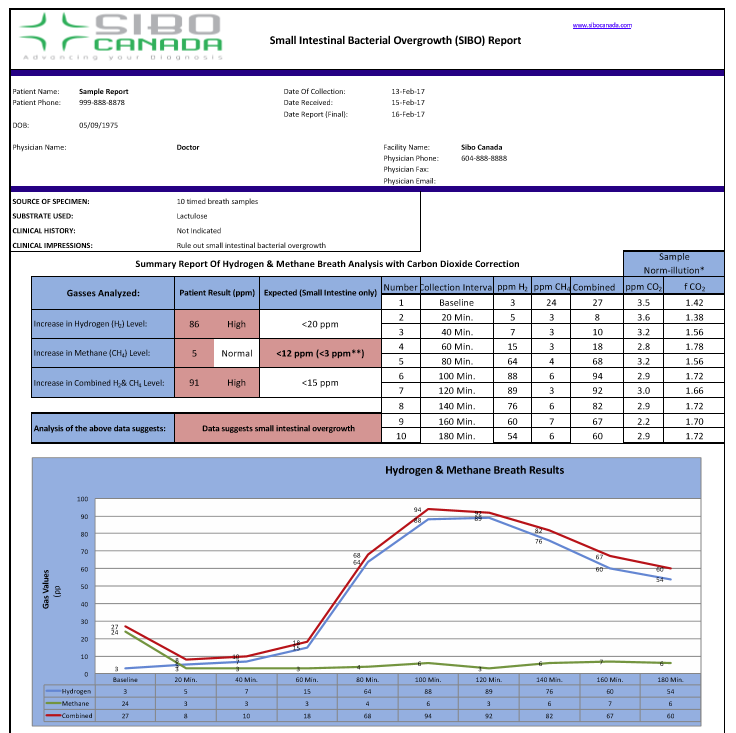Small Intestine Bacterial Overgrowth (SIBO) is estimated to be the root cause of over 70% of all IBS cases. Symptoms are wide ranging, but most common is bloating with excess gas. Others include constipation or diarrhea, heartburn, acid reflux, abdominal pain, weight changes and low energy. Sometimes SIBO can be found along with abnormal levels of stomach acid and skin conditions such as rosacea, acne, psoriasis and eczema.
There are trillions of bacteria and yeast cells living in the digestive tract. Almost all naturally reside in the large intestine. SIBO can be the result of an insult to the digestive system such as food poisoning, traveller’s diarrhea, multiple antibiotic use, food allergies or sensitivities and even another digestive disease (celiac, ulcerative colitis, crohn’s). In these cases, bacteria are able to migrate into the small intestine and colonize, creating an inflammatory state and digestive upset.

Since the bacteria found in SIBO use healthy foods that people consume for energy, bloating can often be inconsistent and difficult to determine which foods were the cause. A breath test using the sugar lactulose as a food source for the bacteria is currently the best way to diagnose SIBO. Bacteria respire certain gases such as hydrogen and methane thus the analysis of gases in an exhalation will determine the presence of SIBO.
At Vitalia, we use the lactulose 3-hour breath test to diagnose SIBO. The test is done at home over a 3 hour period. Once completed, the kit is sent to a local laboratory for analysis. The results are usually ready within two weeks.
Treatment plans vary and can last between 2-3 months, depending on severity and complexity of the SIBO. Symptoms may be relieved within the first 10 days of treatment. At Vitalia, we provide a detailed treatment plan to support overall digestion, treat SIBO and support the long-term health of your digestive system. In this method of treatment, there is a much lower rate of relapse compared to eradication protocols for 2 weeks only.
FAQ
We have 2 options available to obtain a SIBO test:
We recommend booking an initial consultation with one of our Naturopathic Physicians. At this time, your doctor will discuss your health history. You may obtain the collection kit for the SIBO test at this appointment.
Once the results are back, your Naturopathic Physician will develop a treatment plan for you based on the results of the SIBO test and your health history.
The second option is to book a lab consultation only. During this shorter visit, your Naturopathic Physician will discuss if you are a candidate for the SIBO test as well as ensure this is the right test for you. Once suitability is determined, you may obtain the kit at this time.
Once the results are back, only the test results will be explained to you. A treatment plan will not be offered. In order to received an individualized treatment plan, an Initial Consultation is required.
If you are working with another healthcare provider and are only seeking the SIBO test results, the lab consultation may be appropriate for you.
The SIBO test requires some preparation. Here is a summary of the instructions:
*This test requires a 12 hour fast prior to collecting the breath samples.
*This test requires approximately 3 hours to complete and must be completed on a morning. We suggest planning a morning where you can dedicate 3-4 hours to complete the test.
2 WEEKS BEFORE THE TEST:
*Avoid antibiotics or antifungals for 2 weeks before the test. Also avoid colonoscopies or barium enemas during this time.
4 DAYS BEFORE THE TEST:
*Avoid laxatives including Vitamin C and Magnesium. If you cannot avoid laxatives, your Naturopathic Physician at Vitalia Health Care will discuss this with you. Avoid probiotics for 4 days before the test.
1-2 DAYS BEFORE THE TEST:
*Avoid all high fiber and lactose containing foods. Eating these foods may affect the results.
The day before the test, please follow the preparatory diet guidelines. Only eat the foods on the approved list below. If a particular food is not on the approved list, please avoid. If you have any questions, please contact us directly.
The following foods are approved for the preparatory diet:
*Any meat or fish that is baked or broiled. Raw fish is allowed too.
*White bread is approved.
*Plain, steamed white rice.
*Eggs
*Clear meat broth. Please avoid vegetable or bone broth, avoid bouillon.
*Fats and oils are approved. These include coconut, olive and vegetable oil, butter and lard.
*Please only use salt and pepper as seasoning.
*Weak black coffee or tea is approved. Do not use sweeteners, milk or cream
12 HOURS BEFORE THE TEST:
This is the period where you begin your fast. Avoid all food, drinks and non-essential medications. Water is allowed during this period. Please also avoid the use of laxatives during this time until the test is complete.
THE DAY OF THE TEST
Plan to wake up at least one hour before beginning collection of the test. Do not smoke or participate in vigorous exercise for one hour before you start collecting the test. You may brush your teeth as normal before the test.
Please see the attached video HERE for step-by-step instructions on how to collect the sample. Please do not hesitate to contact us if you have any questions.
Where do I drop off the completed sample?
The SIBO kit comes with a prepaid Canada Post shipping label. Once you have collected all the breath samples, please drop off the samples in the box provided to any Canada Post location.
How long will it take to get the results back?
The results are usually available in 14 business days.
Once the results are back, what is the next step?
We will contact you to book a follow up consultation once we receive your test results. Your Naturopathic Physician at Vitalia Health Care will develop a treatment plan to treat your SIBO. This may include Antibiotics specifically to treat SIBO, herbal medicine, diet suggestions and supplements. Supplements may include digestive enzymes and prokinetics. The use of herbal medicine and supplements may work better than just using antibiotics alone.
Please read more about SIBO and treatment options on our website.

